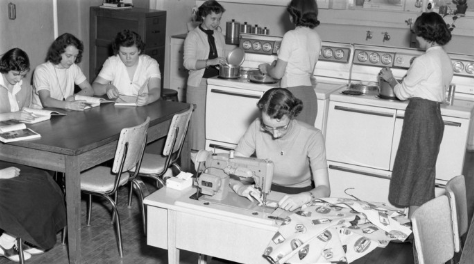Home Economics: A Subject That Has Gone Obsolete.

October 3, 2022
Do you know how to properly cook a meal? Do you know how to raise children and care for a household? How about sew a button back onto a shirt? How to take out a loan? Anything about insurance? Although answers are different from person to person, the vast majority of high school students will graduate without crucial knowledge of the aforementioned topics. Home economics is a neglected subject in today’s education standards. It seems that schools mainly prioritize students’ academic success while unknowingly leaving them in the dark when it comes to life skills.
Schools teach lessons to prepare students academically for college and to pass the tests they give at the end of the unit. Home economics is a class that provides students with useful skills for the real world that are equally as important as academic skills.
Home economics would teach students how to adequately prepare a meal, cleanliness both in the household and individually, and everything finance related. At a youthful and impressionable age, kids and teens should be coached through life courses that they need to survive. Although there are cooking classes, a child and family development class, an accounting class, and a couple other electives offered here at Ludlow High School, none of them are required and some of which are difficult to get into due to the surplus of students wanting to take them. With high demand to take cooking classes, a required home ec class may solve that problem.
“School has prepared us for enjoying life, but not staying alive.”
Sofie Vital, a current senior, believes that school has only scratched the surface of important life skills while primarily putting the focus on career skills. “School has prepared us for enjoying life, but not staying alive.”
Vital proposed the idea of incorporating a required home economics class “into a half year course with gym” so all students could take it. She states that the class could be boring but “everyone would benefit and use what they learned” later on in their lives.
A non-required life skills class would be insufficient, “I do band and have an entirely full schedule with AP and honors classes,” Sofie says. Many students that are committed to full year electives will never be able to find the time to learn skills that’ll change and improve their lives.
Although Sofie was fortunate enough to receive help through her family, she mentioned that “it would be highly insensitive and ignorant to believe everyone has a stable home” to provide adolescents with life skills.
On a scale of 1-10, Vital feels that she’s currently at a 3/10 on overall preparedness and independence in her future. However, life is unpredictable, Sofie claims that “even if we know the basics, our entire life could fall apart.”
Sofie Vital — being a current high school student — expressing her concern about her and her peers being unprepared for their futures due to the lack of life skills proves that even older people had similar struggles.
“I don’t even know if the stuff I’m doing now is ever correct”
Abigail Magee, a junior in college and a Ludlow High School alum, is in the same boat as Sofie. When asked if the school prepared her for her future after graduating in 2020, she responded with a resounding “not at all”. She has purchased a car and applied to colleges and jobs since graduating, all courtesy to her own research and help from parents.
“Every day I find myself learning new things I feel I should’ve known years ago,” Magee stressed when asked about her knowledge of life skills. She feels that the lack of knowledge has been setting her behind others. “If LHS offered home ec, I don’t think I would have been extremely anxious about getting my first job at 19 — which was pushed off a lot later than I would like to admit.”
Even as a graduate, Abigail firmly believes that home economics should be required in schools. Some people struggle to grasp the skills that will keep them alive and healthy. Magee had a nutrition class in her senior year and described it as “not very in depth” but it definitely provided her with a “wider understanding of food and health.”
Whether LHS will consider bringing a home economics class into our schedules or not, Abby mentioned that not only should the school be preparing you but parents and guardians also play an important role. However, she was more insistent on the idea of schools providing the education. “Everyone should get at least a bare-bones education on life skills from schools,” as families may not be able to find the time.
“My parents are busy working and taking care of the house and my sister and I,” she said. Families don’t have the time to teach skills while having to do them the way they know best. “I wish the school at least offered something small for us students.” The lack of expertise in life skills is very degrading. “I don’t even know if the stuff I’m doing now is ever correct,” Abby expressed. On a scale of 1-10, her and Sofie are on the same end of the spectrum, at around 3 or 4.
Not only are high school and college students worried about how to do things correctly in their future, parents are worried for their own children. Some of those parents may have experienced a handful of life skill classes back in the day, keeping those classes would potentially make it easier on them by not forcing them to teach their kids everything they’ve learned.
No Time For Parents
Sally Magee, a mother of two daughters who have experienced LHS first hand (one of which is graduated, whilst the other is a current student), compared her high school experience of learning life skills to her daughters’.
Graduated high school in 1990, Sally Magee didn’t have a home economics class, instead was offered an accounting class and learned the bare minimum. Cooking and insurance was left all up to her. “Back then, when you turned 18 you were thrown into the water and left to fend for yourself. Kids didn’t get to stay on their parents insurance,” Magee stated. Her mother frequently made dinner, but she was far too busy working to take the time to teach it.
“Experience is the best teacher,” Sally stressed when asked if home ec should be required in schools. She believes that it should definitely be required but “it’s good to learn the hard way sometimes.” Life throws obstacles at everyone, nobody can be prepared for everything all the time.
“As a mother, there’s nothing I care more about than my kids’ well-being,” Magee said lovingly after being questioned on if she was worried or not about her kids’ being knowledgeable on life skills. She persistently stated how there “should always be time” for schools to offer life skills. She’s confident in the way she taught her children to write checks, to properly cook, and to clean the house effectively.
Although Sally has taken time out of her busy schedule to educate her children, she firmly believes that families should not be the ones that are forced to teach financial skills to their kids. “With the way the world is now, parents are busy working and kids are busy with extracurriculars,” she said. There’s almost absolutely no time left in the day for families to be teaching and learning.
“It’s difficult to even find enough time in the day to sit down and eat dinner as a family,” Sally Magee said in a defeated manner. She insisted for the sake of busy parents, schools should provide these crucial classes to take some of the load off of parents.
Home economics: a class that teaches kids all things needed to survive. Some may never think that it’s that important until they’re living in a dorm halfway across the country and have no idea how to sew a button back onto their favorite pair of jeans. Many college students will lose a significant amount of money by ordering food because they don’t know how to cook it themselves. High schools strive to prepare students for a future career, they need to strive to prepare them to take care of themselves and maintain a financially stable and healthy lifestyle.












Helen Doel • Jun 28, 2023 at 8:00 am
High schools should definitely have home economics.i think that it is a very important course.please have the school board rethink that.